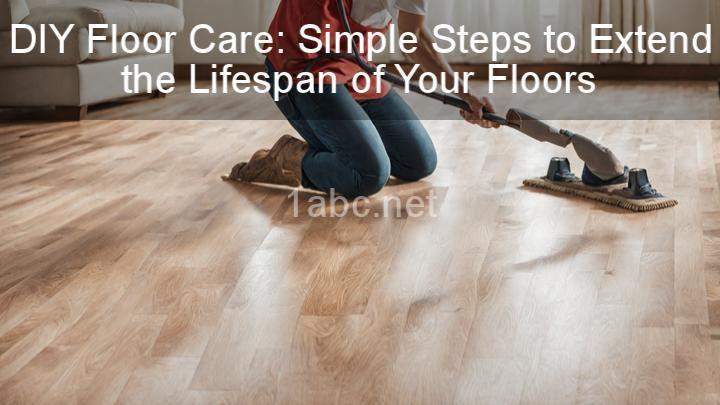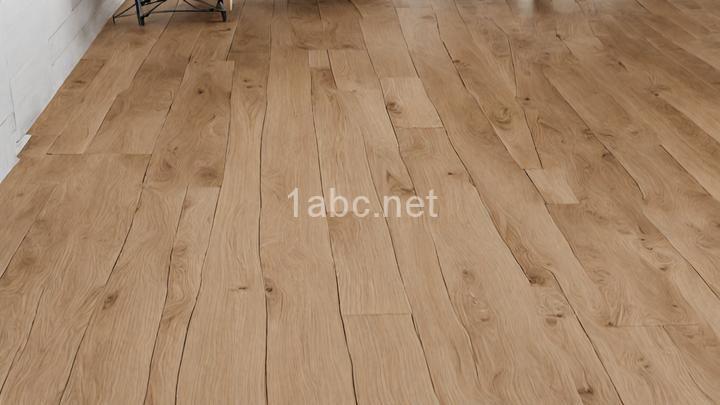DIY Floor Care: Simple Steps to Extend the Lifespan of Your Floors
Introduction:
I. Types of Flooring:
II. General Floor Care Tips:
1. Regular Cleaning:
2. Avoid Excessive Moisture:
3. Proper Spill Cleanup:
III. Flooring-Specific Care Tips:
1. Hardwood Floors:
2. Laminate Floors:
3. Tile Floors:
IV. Preventive Measures:
1. Furniture Pads and Protectors:
2. Regular Maintenance:
Conclusion:

Introduction:
Hello there, fellow floor enthusiasts! Welcome to our blog post on DIY floor care. We're excited to share some simple and effective tips on how to extend the lifespan of your floors. Whether you have hardwood, laminate, or tile floors, proper care is essential to keep them looking their best for years to come. So, let's dive right in and discover the secrets to maintaining a healthy and beautiful floor!
I. Types of Flooring:
Before we delve into the nitty-gritty of floor care, let's take a moment to explore the different types of flooring commonly found in homes. The most popular ones include hardwood, laminate, and tile. Each type has its unique characteristics and requires specific care methods. It's crucial to understand the nuances of your flooring to ensure you're using the right techniques and products.
II. General Floor Care Tips:
1. Regular Cleaning:
Regular cleaning is the foundation of floor care. Sweeping or vacuuming your floors on a regular basis is essential to remove dirt, dust, and debris that can scratch or damage the surface. A microfiber mop or cloth is an excellent choice for gentle and effective cleaning, as it traps particles without leaving behind residue.
2. Avoid Excessive Moisture:
Excessive moisture is the arch-nemesis of many flooring types. It can cause warping, staining, and even mold growth. To prevent this, consider using mats or rugs near entryways and high traffic areas to capture dirt and moisture. It's also important to wipe up spills immediately to prevent stains or water damage.
3. Proper Spill Cleanup:
Accidents happen, and spills are inevitable. However, how you handle them can make all the difference. To prevent permanent damage, it's crucial to act quickly. Blotting or wiping up spills immediately can help prevent stains or warping. The approach to spill cleanup may vary depending on the type of flooring you have. For example, using a mild soap and warm water solution can be effective for cleaning spills on tile floors.
III. Flooring-Specific Care Tips:
1. Hardwood Floors:
Hardwood floors exude elegance and sophistication, but they require special care to maintain their beauty. When cleaning hardwood floors, it's essential to use gentle cleaning products specifically designed for this flooring type. Harsh chemicals and excessive water can damage the wood, so it's best to avoid them. Instead, opt for pH-neutral cleaners and a damp mop or cloth for regular maintenance.
2. Laminate Floors:
Laminate floors are a popular choice for their durability and affordability. To keep them looking their best, it's important to avoid excessive moisture. When cleaning laminate floors, a damp mop with a mild floor cleaner made specifically for laminate surfaces is ideal. Avoid using abrasive cleaners or excessive water, as they can cause damage.
3. Tile Floors:
Tile floors are known for their longevity and versatility. To maintain their appearance, regular sealing is recommended to protect against stains and grout discoloration. pH-neutral cleaners are the safest option for cleaning tile floors, as they don't leave behind residue or damage the grout. A soft brush or mop can be used to gently scrub the surface without scratching the tiles.
IV. Preventive Measures:
1. Furniture Pads and Protectors:
Preventing scratches and dents on your floors can be as simple as using furniture pads and protectors. Placing furniture pads under heavy furniture helps to distribute weight evenly and prevent scratches. For furniture with wheels, consider using furniture coasters to avoid indentations or damage to the floor.
2. Regular Maintenance:
In addition to regular cleaning, periodic maintenance tasks are essential for preserving the lifespan of your floors. This might include polishing, refinishing, or resealing, depending on the type of flooring you have. It's important to follow manufacturer guidelines and seek professional assistance if needed. Regular maintenance not only restores the floor's beauty but also helps to protect it from wear and tear.
Conclusion:
Congratulations! You've now become a DIY floor care expert. By following these simple steps, you can extend the lifespan of your floors and keep them looking beautiful for years to come. Remember, regular cleaning, avoiding excessive moisture, and using proper cleaning techniques for specific flooring types are the keys to success. So, go ahead and implement these tips to enjoy healthier and longer-lasting floors in your home. Your floors will thank you!
Now it's your turn! We'd love to hear your thoughts and experiences with floor care. Have you tried any of these tips? Do you have any additional advice to share? Leave a comment below and let's continue the conversation. Happy floor care!
FREQUENTLY ASKED QUESTIONS
What is DIY Floor Care: Simple Steps to Extend the Lifespan of Your Floors?
DIY Floor Care: Simple Steps to Extend the Lifespan of Your Floors is a guide that provides easy-to-follow instructions for maintaining and caring for your floors. By following these simple steps, you can ensure that your floors stay clean, vibrant, and in good condition for a longer period of time. Whether you have hardwood, laminate, tile, or carpet flooring, this guide will offer valuable tips and techniques to help you preserve the beauty and longevity of your floors. So, if you're looking to save money on professional cleaners or expensive repairs, this DIY floor care guide is a great resource to help you take care of your floors on your own.
Why is it important to take care of your floors?
Taking care of your floors is important for several reasons:
- Appearance: Well-maintained floors enhance the overall appearance of your space. Clean and well-kept floors can create a positive impression and make the room look more inviting.
- Durability: Regular maintenance helps to extend the lifespan of your floors. Proper care, such as cleaning and regular inspections, can prevent damage and minimize wear and tear.
- Safety: Maintaining your floors helps to ensure a safe environment. Regular cleaning and maintenance reduces the risk of slips, trips, and falls caused by uneven or slippery surfaces.
- Hygiene: Floors can accumulate dirt, dust, allergens, and other contaminants over time. Proper cleaning and maintenance not only improve the hygiene of the floors but also contribute to better indoor air quality.
- Cost savings: By taking care of your floors, you can avoid costly repairs or replacements. Preventative maintenance and timely repairs can save you money in the long run.
Remember to follow the manufacturer's recommendations for cleaning and maintaining your specific type of flooring to ensure its longevity and appearance.
What types of floors can benefit from DIY floor care?
There are several types of floors that can benefit from DIY floor care. Some of the common types include:
- Hardwood Floors: DIY floor care can help maintain the shine and protect the finish on hardwood floors. Regular cleaning and polishing can keep them looking beautiful for years.
- Laminate Floors: Laminate floors are known for their durability, but they still require proper care. DIY floor care can help remove dirt, prevent scratches, and maintain the vibrant appearance of laminate flooring.
- Vinyl Floors: Vinyl floors are popular in kitchens and bathrooms due to their water resistance. DIY floor care can help keep vinyl floors clean, remove stains, and protect the surface from wear and tear.
- Tile Floors: Whether it's ceramic, porcelain, or natural stone tile, regular DIY floor care can help preserve the luster and cleanliness of tile floors. Cleaning and sealing the grout lines are integral parts of tile floor maintenance.
- Concrete Floors: If you have a polished or stained concrete floor, DIY floor care can help maintain its glossy appearance. Regular cleaning and occasional resealing can protect the concrete from stains and damage.
It's important to note that different types of floors may require specific cleaning methods and products. Always refer to the manufacturer's guidelines or consult professional advice to ensure proper DIY floor care for your specific flooring type.
How often should I perform DIY floor care?
To keep your floors in good condition, it is recommended to perform DIY floor care on a regular basis. The frequency of floor care depends on the type of flooring you have and the level of foot traffic in your home. Here are some general guidelines:
- Sweeping or vacuuming: This should be done at least once or twice a week to remove dirt, dust, and debris from the surface of the floor.
- Mopping: The frequency of mopping depends on the type of floor and the amount of traffic. For most hard floors, mopping once every one to two weeks is sufficient. However, high-traffic areas may require more frequent mopping.
- Polishing or waxing: Floors that require polishing or waxing, such as hardwood or vinyl, should be done every few months or as needed to maintain their shine and protect the surface.
Remember to always follow the manufacturer's recommendations and use appropriate cleaning products for your specific floor type. Regular maintenance will help extend the life of your floors and keep them looking their best.
